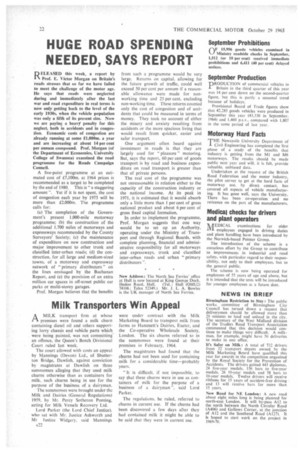HUGE ROAD SPENDING NEEDED, SAYS REPORT
Page 24

If you've noticed an error in this article please click here to report it so we can fix it.
ELEASED this week, a report by Prof. E. Victor Morgan on Britain's roads stresses that so far we have failed to meet the challenge of the motor age. He says that roads were neglected during and immediately after the last war and road expenditure in real terms is now only getting back to the level of the early 1930s, when the vehicle population was only a fifth of its present size. Now we are paying a heavy penalty for this neglect, both in accidents and in congestion. Economic costs of congestion are already running at some £1,000m. a year and are increasing at about 14 per cent per annum compound. Prof. Morgan (of the Department of Economics, University College of Swansea) examined the road programme for the Roads Campaign Council.
A five-point programme at an estimated cost of £7,100m. at 1964 prices is recommended as a target to be completed by the end of 1980. This is " a staggering amount ". Yet if it is not spent, the cost of congestion each year by 1975 will be more than £2.000m. The programme calls for:
(a) The completion of the Government's present 1.000-mile motorway programme; (b) the construction of the additional 1,700 miles of motorways and expressways recommended by the County Surveyors' Society; (c) the maintenance of expenditure on new construction and major improvement to other trunk and classified inter-urban roads; (d) the construction, for all large and medium-sized towns, of a motorway and expressway network of "primary distributors" on the lines envisaged by the Buchanan Report, and (e) the provision of an extra million car spaces in off-street public car parks or multi-storey garages.
Prof. Morgan believes that the benefits
from such a programme would be very large. Returns on capital, allowing for the future growth of traffic, could well exceed 50 per cent per annum if a reasonable allowance were made for nonworking time and 25 per cent, excluding non-working time. These returns counted only the cost of congestion and of accidents that could be measured in terms of money. They took no account of either the misery and anxiety resulting from accidents or the more spacious living that would result from quicker, easier and safer transport.
One argument often heard against investment in roads is that they are largely used for "pleasure " motoring. But, says the report, 60 per cent of goods transport is by road and business expenditure on road transport is greater than that of private persons.
The real cost of the programme was not unreasonable in relation either to the capacity of the construction industry or the national income. At its peak in 1971, it is estimated that it would absorb only a little more than I per cent of gross national product and about 6 per cent of gross fixed capital formation.
In order to implement the programme, Prof. Morgan suggests that one way would be to set up an Authority, operating under the Ministry of Transport and through Regional Boards, with complete planning, financial and administrative responsibility for all motorways and expressways. trunk and classified inter-urban roads and urban "primary distributors ".
New Address: The North Sea Ferries' office at Hull is now located at King George Dock. Hedon Road, Hull. (Tel.: Hull (OHU2) 74106; Telex 52349.) Mr. J. L. A. Bowles is the UK manager of North Sea Ferries.




















































































































